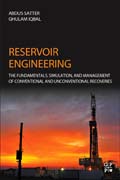
Reservoir Engineering: Fundamentals, Reservoir Simulation, Management, and Unconventional Recoveries
Satter, Abdus
Iqbal, Ghulam M.
More than any other discipline, reservoir engineers are required to investigate, analyze and compile a tremendous amount of data and property inputs in order to forecast the rate of recovery of oil and gas basins. There are many reliable methods to treat conventional reservoirs, but today's reservoir engineer primary function is shifting to accommodate the emerging unconventional reservoirs, including tight gas, shale, and coalbed methane. Reservoir Engineering enhances the reservoir engineer's approach to the more complex basins, alleviating a much higher level of uncertainty. Covering critical reservoir elements and tying them to today's projects, Reservoir Engineering helps: . Bridge the conventional methods over to unconventional, showing the differences between the two processes . Explain best practices on reservoir management and recovery approaches, backed with real-world case studies . Test your skills and training with question and answer sessions after chapters Connects key reservoir fundamentals to modern engineering applicationsUpgrades your reservoir engineering skills with management and recovery of unconventional resources Highlights the importance of protecting your investment with online calculation spreadsheets INDICE: Chapter 1 Introduction to Reservoir Engineering and Management PracticesChapter 2 Elements of Petroleum Reservoirs: Origin, DepositionalEnvironments, Accumulation and Migration of PetroleumChapter 3 Reservoir Rock PropertiesChapter 4 Reservoir Fluid PropertiesChapter 5 Phase Behavior of Hydrocarbon Fluids in ReservoirsChapter 6 Reservoir CharacterizationChapter 7 Reservoir Life Cycle and Role of ProfessionalsChapter 8 Reservoir Management Processes and Case Studies In Engineering ManagementChapter 9 Fluid Flow through Porous MediaChapter 10 Transient Well Pressure TestsChapter 11 Primary Recovery Mechanisms and Recovery EfficienciesChapter 12 Volumetric Method in Petroleum Reservoir AnalysisChapter 13 Decline Curve AnalysisChapter 14 Classical Material Balance MethodChapter 15 Reservoir Simulation MethodChapter 16 Water Flooding and Water Flood SurveillanceChapter 17 Enhanced Oil Recovery Processes: Thermal, Chemical, and Miscible MethodsChapter 18 Horizontal Well Technology and PerformanceChapter 19 Oil and Gas Recovery Methods: 19A Infill Drilling In heterogeneous reservoirs 19B Low permeability reservoirs Chapter 20 Rejuvenation of Reservoirs with Declining PerformanceChapter 21 Unconventional Oil ReservoirsChapter 22 Unconventional Gas ReservoirsChapter 23 Petroleum Reserves and World OutlookChapter 24 Reservoir Management Economics, Risks and Uncertainties
- ISBN: 978-0-12-800219-3
- Editorial: Gulf Professional Publishing
- Encuadernacion: Cartoné
- Páginas: 352
- Fecha Publicación: 23/10/2015
- Nº Volúmenes: 1
- Idioma: Inglés
